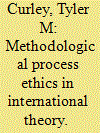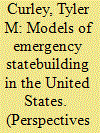| Srl | Item |
| 1 |
ID:
132918


|
|
|
|
|
| Publication |
2014.
|
| Summary/Abstract |
In this review essay, I identify a commonality between Patrick Thaddeus Jackson's The Conduct of Inquiry and Daniel J. Levine's Recovering International Relations: an ethical methodological process to organize international theories in ways that promote a plurality of visions. Jackson's ideal-typification of the various methodological approaches in international relations encourages a pluralistic science. Likewise, Levine's constellation method demands a multiplicity of theoretical perspectives, in order to sustain the critical elements intrinsic to each. As I argue, this shared methodological process ethic not only advances theoretical pluralism but, in so doing, actively opens thinking space for constructing alternative political realities.
|
|
|
|
|
|
|
|
|
|
|
|
|
|
|
|
| 2 |
ID:
141310


|
|
|
|
|
| Summary/Abstract |
Over the last decade, the impact of emergencies on the American state has become the subject of renewed interest. While early literature in the post-9/11 era often overlooked the historical development of crisis governance in the United States, many scholars have begun to uncover the precedents that continue to shape modern emergency management. In an effort to clarify the main analytical assumptions of the existing scholarship, I construct three models of emergency statebuilding: permanent emergency state, national security state, and contract state. The models each share an underlying framework of historical institutionalism, which defines the state as a stabilized material institutional structure that is disrupted by emergency conditions—exogenous shocks that cannot be incorporated into the normal statebuilding processes or legal order. Yet this perspective is ill-equipped to explain institutional change. I propose discursive institutionalism as an approach that emphasizes how discourse and ideas construct emergencies as objects of government management—in different ways, at different times. I then illustrate the utility of this perspective by demonstrating the influence of national planning ideas on efforts to prepare the state for emergencies before they occur.
|
|
|
|
|
|
|
|
|
|
|
|
|
|
|
|
| 3 |
ID:
091024


|
|
|
|
|
| Publication |
2009.
|
| Summary/Abstract |
In this article, I build a theory of European Union (EU) expansion using Social Identity Theory. The theory proposes that the development of a national identity in relation to Europe is the most significant contributing factor to a policy to support/oppose expanding the EU to include applicant countries. According to the theory, strength of identity-whether more national or European-is the key variable in explaining the policy toward applicant countries. As a preliminary exploration of the theory, I look at why some decision-makers within EU countries support Turkey's accession while others do not. The identities among top decision-makers within Britain, Germany, and France are used to examine the policy preferences regarding Turkey's bid for membership into the EU during these three recent progressions: the recognition of Turkey as a candidate country in 1999, the development of a timeline for full membership in 2002, and the beginning of accession negotiations in 2005.
|
|
|
|
|
|
|
|
|
|
|
|
|
|
|
|